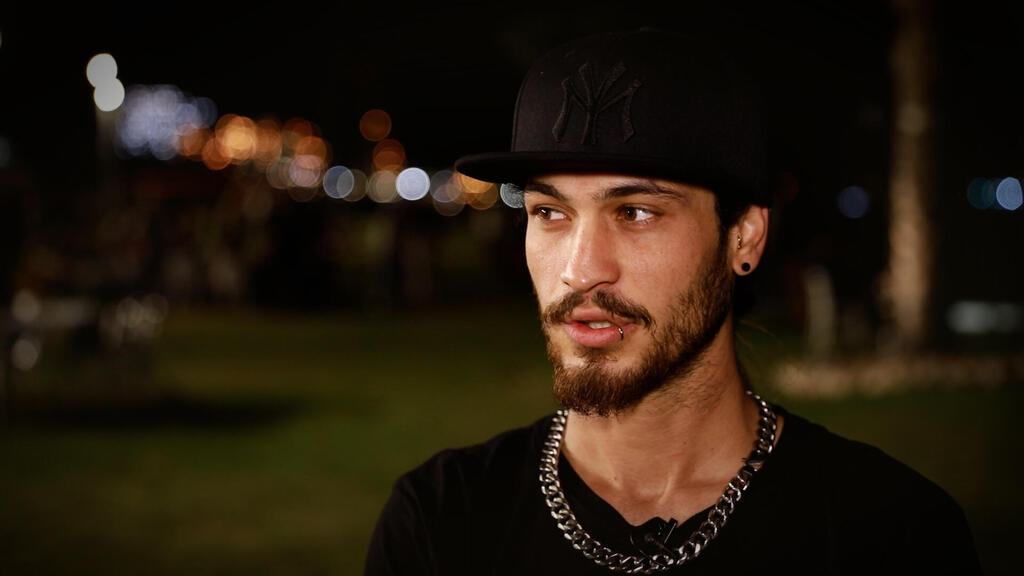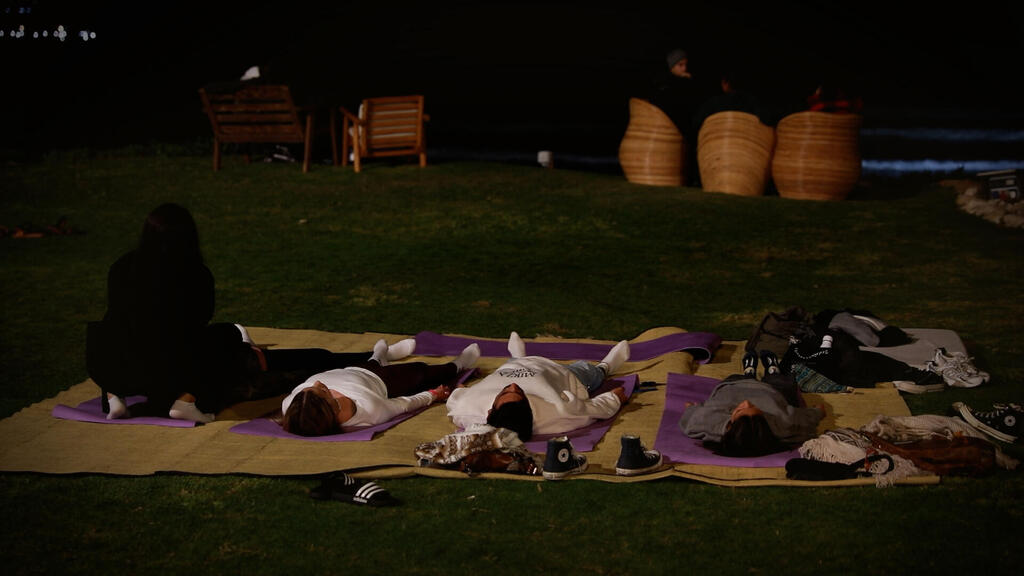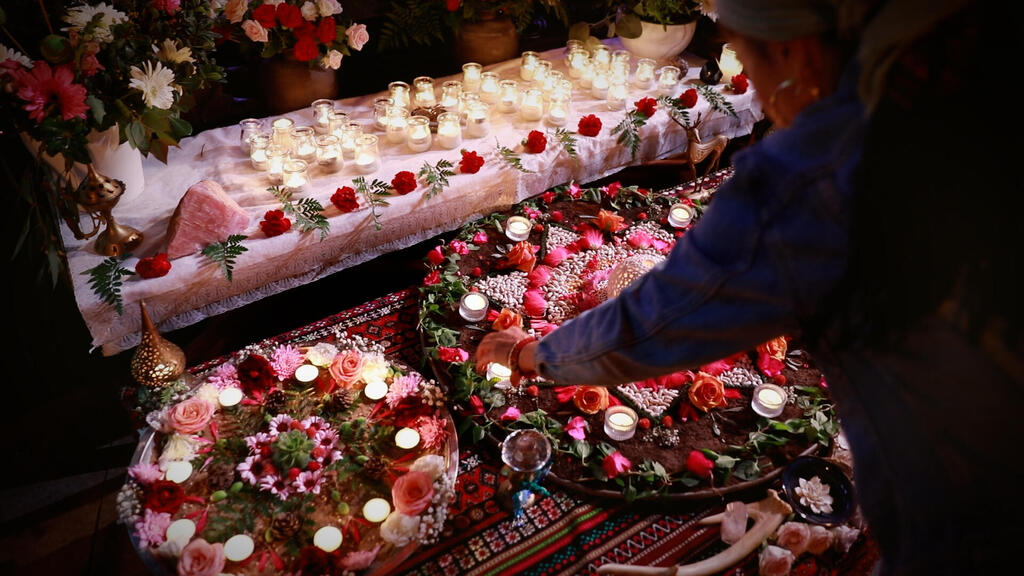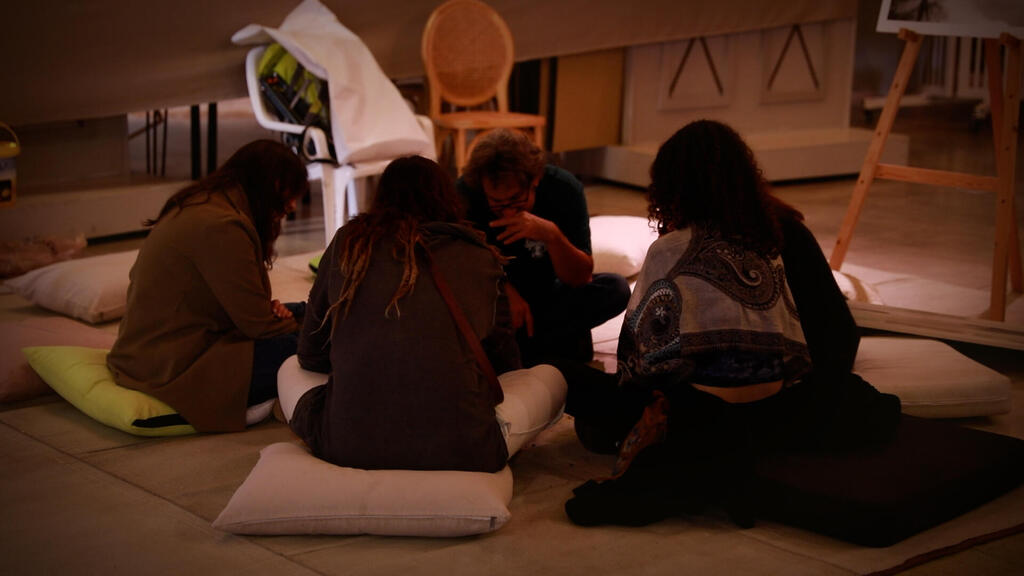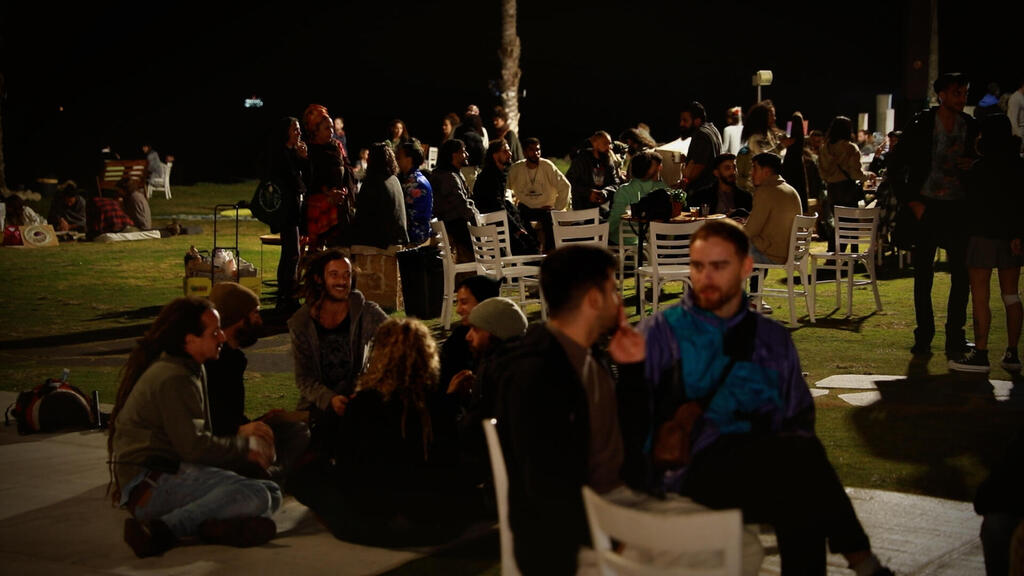Getting your Trinity Audio player ready...
On one side of the Izunova complex, DJ Darvish, whose son was killed at the Nova music festival that became a massacre, is playing his electronic music set and, not too far from there, young people are dancing to the music of Ehud Banai. On the other side of the complex, it is hard to remain composed at the sight of all the equipment left behind by the festival's victims, arranged in piles, reminding us of this dark time in history, and families who have come to identify and collect the items of their loved ones. Shoes, keys, vehicles, bags and clothes that were soaked in blood and washed by volunteers. This is their last memory.
Nova survivors
In the Kochav Hayam complex in Caesarea, which started to operate just days after the attack, the producers of the Nova party collaborated with Kfar Izun, which has been specializing in the treatment of crisis situations, trauma and drugs for the past 23 years, to try to treat the victims of the Nova music festival. About 1,000 young people come there every evening to sit together, talk with caregivers in special clinics made of wood that were specially brought there, draw and, above all, understand that this is only the first stage of the long rehabilitation that still awaits them.
More stories:
Hayun, who managed to save himself on October 7, comes to the compound in Caesarea every day.
He was supposed to play at noon at the festival that turned into a mass massacre - a set that he worked on for a long time in advance, but was not played. "It made me sad. I saw the crowd and the energy in the square and everyone was colorful and happy, and suddenly everything changed. At 6:30 a.m. I saw terrorists everywhere and it was just like a horror movie. It's tragic. I got out of there miraculously. Policemen who came and were with me did not return. I hid for eight hours in the trunk of my car while vehicles next to me exploded from RPG shells and only the next day I arrived back in Tel Aviv," he shares.
"From the first moment that I returned to my apartment in Tel Aviv, I was in shock. Many of my friends did not return with me, and in the first week we went to funerals. After a few days, I arrived at the compound with many other people who wanted to try to deal with the trauma we went through," he says. "For me, right now this compound is home, there's routine which I don't have now. My job is music, and I don't have any concerts, no flights to festivals, and we're here for the time being. We're trying to find a certain routine and continue our lives somehow."
"I've tried all the facilities," he says with a smile, and shares which areas in the complex help him personally: "whether it's acupuncture, meditation, touch therapy and even the performances here every day. They give us the space to express ourselves. It's important for us to commemorate and remember our friends who are not with us as much as possible. It tugs at my heart."
"My family comes here a lot," shares Hayun. "They know that I won't return home, and this place is good for me. They come here in support."
Omri Frish, who founded and manages Kfar Izun, a treatment-rehabilitation village for young people which specializes in crisis situations, trauma and drugs, has seen a lot over the years. "I've never seen anything like this. I'm a Yom Kippur War veteran. It's crazy," he says as tears fill his eyes.
The collaboration is extraordinary, according to Frish. "What happened here is something amazing. A kind of impossible connection that succeeded immensely. I mean, to take an organization that produces outdoor and trance parties and an organization with a village treating party casualties, and to successfully connect them under the circumstances of the war," he explains.
Frish has been astounded by the young people who collaborated with him. "You have to remember that the Nova producers survived the party themselves, they were also shot and slaughtered. They could have said 'this is not our responsibility', but they chose otherwise, and a very good relationship was formed between us," he says.
Dr. Orit Shapiro, director of the Balance Association - Back on Track, says that "the goal was to take the lead in all therapeutic aspects." Together with a team that included more than 200 volunteers, they created a place that would provide a complementary solution for the survivors - they help with the survivors' emotional needs and the state takes care of their rights.
The treatment of trauma in relation to drug use
In order to understand the complexity of the issue and provide the appropriate treatment, the therapists go through customized training to understand psychedelic drugs and their effects.
"Trance culture is intertwined with the global psychedelic movement. We provide special training to therapists to deepen their familiarity with the subject," explains Dr. Hagit Boni-Noach from the Department of Criminology at Ariel University, who researches the subject of such parties and drug use in Israel. She says that Nova party survivors talk about different effects of the drugs they took. "Some people said they took stimulant drugs and that's what made them run dozens of kilometers, it gave them strength," she explains.
Frish, the founder of Kfar Izun, clarifies the complexity of drug use in the moment of the attack, in contrast to the treatment of other groups that have gone through trauma.
"The sunrise at a rave has a significant role. The young people prepare for this moment, the sun rises and you expect a certain feeling, but suddenly explosions and gunshots. Young people tell us how the trip changed for them and how they translated it into reality," he explains.
Boni-Noach advocates a therapeutic approach of minimizing harm. "I know that for many young people the drugs currently help to dull the pain and they continue to consume a minimal dose as they did before, or to smoke marijuana; but it is important to know that for some it helps and for others it creates a problem," she says. "It is not recommended to take mind enhancers during this period. Even if the place feels seemingly safe to you, the mind may be saturated with fear and anxiety, and the substances may intensify these things, leading to loops and confusion. Another recommendation is to lower the doses."
"The treatment people should be non-judgmental on the one hand, and on the other hand you really need to pay attention to the drug issue. Although in Israel there are pilots of post-trauma treatment using hallucinogenic substances such as mushrooms, ketamine and MDMA (ecstacy), but it is a long process that includes a wide envelope with an accompanying psychiatristm and everything has its time."
Preparing for the next stage in rehabilitation
While other initiatives and other complexes have begun to shut down one by one, Kfar Izun, in cooperation with other parties, is preparing for the next phase of the rehabilitation process. "At the stage we are in, it is not treatment, not in the classical sense. It is more assistance, support and inclusion. These are not things we have ever known about, not in the literature and not with such intense trauma from cruelty and evil while many of the people were under the influence of psychedelic drugs," explains Frish.
"I have never heard of such a thing in all my decades of work, and there are many things we are relearning here. We are trying to release the accumulation. Even when this place closes, most people will need therapy; they will live with the trauma for many more years and some will need deeper treatment."
It is our duty to bring all the people back to normal, to a normal and useful life for their sake, for their relatives and for our sake in the State of Israel
The second phase program, which will begin this month, includes social workers, psychological assistance, claiming their rights to assistance from the state, employment counseling and guidance for local authorities in providing a tailored response to young people and their families for a period of another six months. The rehabilitation effort also requires financial support, part of which is funded by the National Lottery, or Mifal HaPayis.
"We chose to invest in providing a holistic solution for treatment and assistance to the survivors of the festival in the south, which instantly turned into a bloody war zone," says National Lottery CEO Benny Dreyfus, who helps with the program's continued funding. "We as a society must do everything we can in order to reduce the traumatic consequences as much as possible and concentrate on recovery, empowerment and revival. It is our duty to bring all the people back to normal, to a normal and useful life for their sake, for their relatives and for our sake in the State of Israel."
"There are people for whom there is no other option from a clinical point of view," explains Frish, and emphasizes that Kfar Izun is designed to try to provide a different solution for those who can be treated without hospitalization. "It is possible that some of the hospitalizations can be prevented here as well. Everyone has to choose what is best for them. We learned that the families are also in need of help and we started doing that, too. Seventy family members came to the last meeting we held."
Despite the complex hosting of many of the survivors, the Nova producers are constantly looking for more young people who have not found the strength yet to get help for their recovery. Raz Malka, one of the Nova producers, who was also saved from the same inferno, calls on the people who were affected to try and come. "We are busy day and night to find everyone and reach everyone."
"We need everyone to help, to open their ears and eyes, and look for that person who still hasn't gotten out of bed," Malka says. "Being involved every day in the production of this thing, this is my way of taking care of myself. We have a closed Facebook group with a phone number. Just make the initial contact and let us continue from there," he adds.
DJ Oren Hayun also urges the survivors of the party to seek help. "If they don't come here and stay at home and don't communicate with those close to them, there is a fear that their situation will deteriorate. My message is that they should come here, there is no problem even contacting the producers and they will help them come and do everything necessary. The main thing is that they come and try to get treatment. It's not easy, but people are getting help here," he says.






